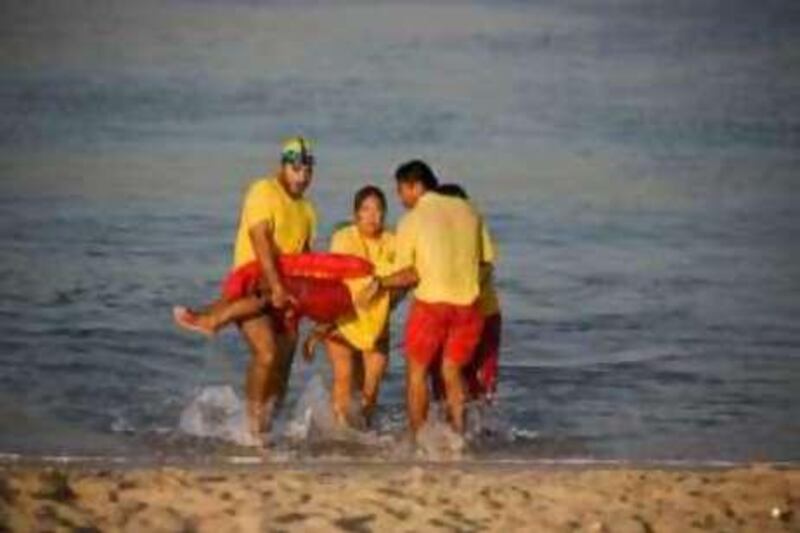DUBAI // With 700 miles of coastline and almost year-round sunshine it is no surprise that tourism in the UAE is booming despite the global financial slowdown. However, as more people flock to our shores, the number of water-related tragedies is also on the rise. Drowning is the second highest cause of accidental death after road accidents and lifesaving experts say the country has a long way to go to reach an accepted level of water safety. Pete Whittall and Scott Gardner, from Leisure Training and Advisory Services, a lifeguard training centre in the UK, are in Dubai this month to retrain all the municipal pool and beach lifeguards to Royal Life Saving Society (RLSS) standards. Mr Whittall said this was a "major positive step" towards reducing the number of drownings but added that more needed to be done. "Dubai Municipality has already shown its commitment towards improving its water safety record by bringing us out here for the training," he said. "They made a promise earlier this year to train lifeguards up to an international standard and within a few months they delivered on it. However, training the lifeguards is only a small part. We work on prevention rather than cure, so we would like to introduce a level of beach and poolside education as well as of course making sure that all the lifesaving equipment is of the highest quality." This month 29 municipal lifeguards are being put through their paces on Jumeirah Open Beach and Al Mamzer Beach Three. They are taking one-week courses at the end of which Mr Whittall and Mr Gardner will test them on fitness, rescue methods in and out of the water and ability to deal with multiple casualties. To qualify, participants must complete a 400m sprint up the beach followed by a 200m swim to a conscious victim and a 200m tow back to shore. They must also rescue an unconscious casualty from the sea floor and administer mouth to mouth resuscitation while in the water and cardiopulmonary resuscitation on shore. The final part of the test is a simulated emergency in which the lifeguards must work as a team to create an exclusion zone on the beach for a helicopter landing and use international hand signals to direct each other and the helicopter pilot. Successful participants will receive a certification valid for two years. "Having the RLSS certificate will give both the lifeguards and the public confidence," said Mr Whittall. "But this is only the start of what we hope will be a fully comprehensive review of the beaches and pools in terms of safety." After the training, the two instructors will give the municipality a report assessing the quality of observation towers, first aid equipment, warning signs and educational information. They will also recommend ways to improve the system's management structure. "At the moment there are no head lifeguards which means no one is on hand to hold individuals to account," Mr Gardner said. "They are all great lifeguards but if they receive no direction on a day-to-day basis then it can be difficult to stay focused." Mohammed al Louz, the head of unit for Deira Parks section at Dubai Municipality, who looks after beach regulations, said he was aware of the situation. "We know we have more and more people visiting Dubai every day as well as a growing number of residents, so it is a top priority to make sure everyone is safe," he said. "This is why we asked Mr Whittall and Mr Gardner to come and retrain the current lifeguards. "However, we are aware this is just the beginning. We have asked for a full report about beach and pool safety as well as advice on selecting the best lifeguards. Not only do we want to be able to see the -minimum and maximum of our current level of training, but we want to make the process self-sufficient for the future. For this we hope our best lifeguards will move on to be instructors." Mr Louz said all new lifeguards would in future be trained to RLSS standards. Mr Whittall hoped Dubai's example would be followed nationwide since it would be the quickest way to achieve a national lifesaving standard that could dramatically reduce the number of drownings. "I hope that soon municipalities from other emirates will follow Dubai's lead so that every beach is patrolled by professionals of the same ability," he said. "This will allow a federal standard to be brought in which will be able to be self-regulated and therefore increase water safety. aseaman@thenational.ae
Lifeguards retrained to UK standards
Dubai Municipality invites British group to certify its lifeguards as the city implements measures to increase safety.

Editor's picks
More from the national





